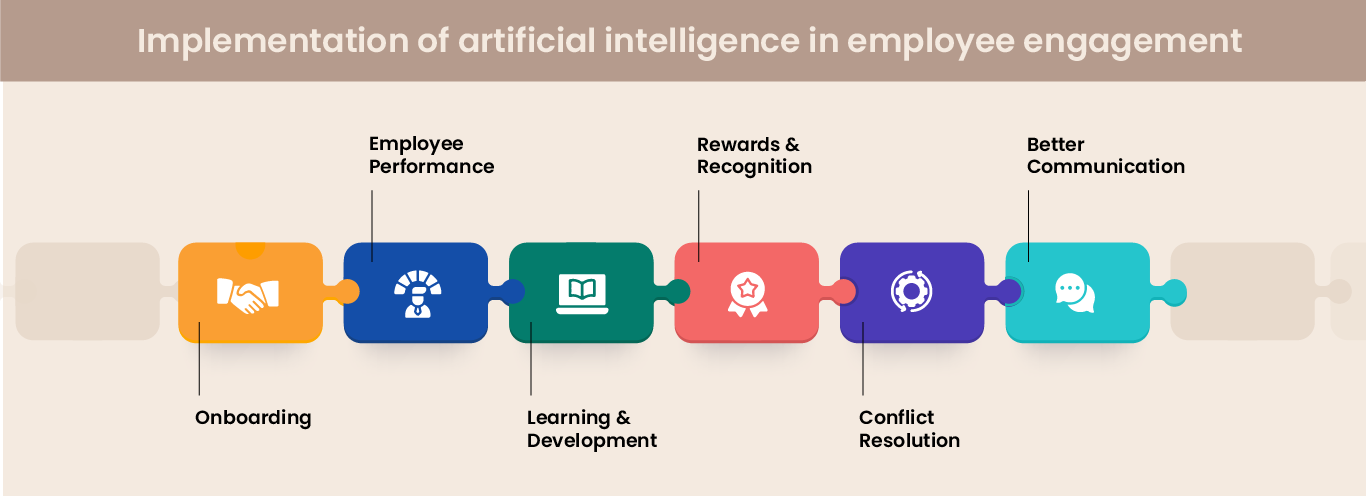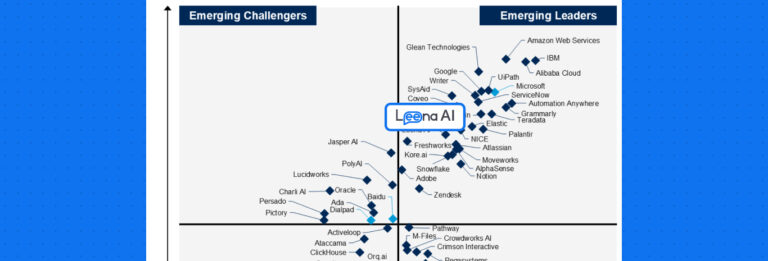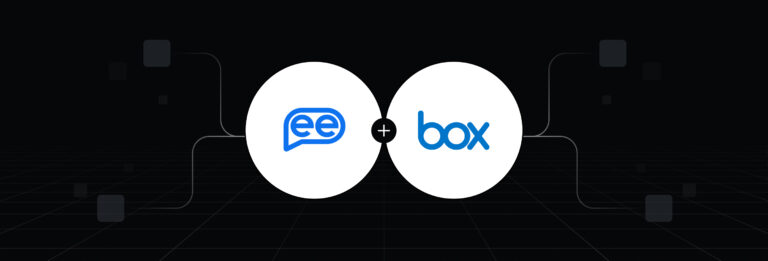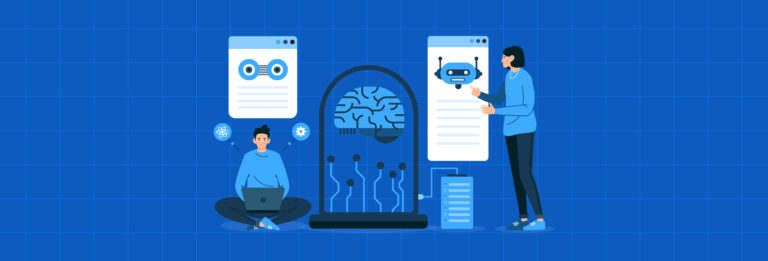In today’s tech landscape, AI in employee engagement and HR plays a significant role— with no signs of stopping. With tools to resolve customer queries quickly, manage and develop talent, monitor performance and productivity, schedule meetings, and generate reports — AI is turning employee management on its head.
As a result, companies worldwide have begun leveraging use of AI in employee engagement as a way to tackle the engagement challenge efficiently. Read on to know how AI is affecting the future of employee engagement and the different areas where it can make discernible impacts.

Traditional vs new-age employee engagement practices
Employee engagement changes with what is happening in and around the world. A practice that’s working today might be irrelevant after a few years, months, or even days. Therefore, forward-thinking leaders and managers must stay up-to-date on the latest engagement trends.
As generations change in the workforce, the trends, tools, and solutions to engage and retain employees and measure their engagement levels are also changing. For example, while baby boomers and Gen X consider face-to-face conversations the most efficient way of communication, millennials and Gen Z are more interested in how digital engagement tools could revolutionize how they work and engage with others.
Further, the ongoing pandemic and remote working have brought new changes for the leaders and HR professionals. Traditional employee engagement tactics, such as two-way communication, conservative employee recognition programs (cash gifts, verbal praise, non-personalized rewards), and rigorous classroom training, don’t work anymore in today’s competitive corporate landscape. In fact, they do more harm than produce the expected results.
Hence, organizations are replacing them with innovative tools to engage employees.
New-age digital tools use employee engagement bots powered by machine learning (ML) to engage their workforce and evaluate their engagement level.
- By using algorithms, analytics, and coding programs, these technologies can monitor employees’ performance in real-time and highlight improvement areas.
- Further, techniques like sentiment analysis and natural language processing (NLP) of the text conversations can determine their mood at work and future performance based on behavior patterns, facial gestures, and body language.
In a nutshell, the fusion of artificial intelligence and employee engagement AI-powered employee engagement is crucial to increase employee productivity, promote better communication, build a collaborative work culture, and ultimately boost employee engagement in the organization.
In the following sections, we’ll talk about the applications of AI tools in organizations in detail.

The increasing implementation of artificial intelligence in employee engagement
From personalizing the onboarding process and deriving insights from employee performance data to using employee engagement bots, creating customized learning and development programs and removing bias in the workplace, organizations are now leveraging AI and everything it has to offer.
In fact, HR professionals are leveraging the fusion of artificial intelligence and employee engagement as an effective way to boost recruiting, training, and developing talent.
Data-backed technologies like chatbots, predictive analytics, machine learning, and natural language processing are enabling and empowering HRs to set and achieve SMART goals and build impactful HR processes. Besides, AI also offers various other benefits, such as:
- Sentiment and behavioral analysis
- Real-time performance monitoring
- Data-backed and effective decision making
- Increased productivity among employes
- Lesser human errors, biasedness, and human prejudices
- A quick search for talent
- Low employee attrition rates, and more.
In a nutshell, as organizations are becoming more employee-centric, AI is helping them create a happier work environment, eliminate bias and human errors, increase workforce’s productivity, and leverage useful and relevant systems that are more focused on holistic employee growth and development and creating a positive experience for them.
The use of AI in employee engagement

Artificial intelligence and employee engagement work simultaneously in a technology driven world.. Let’s look at some areas where it can help improve the overall employee experience:
Onboarding
Onboarding is a crucial aspect of the recruitment process, and it’s HR’s responsibility to make it as seamless as possible. This is where AI can help.
Artificial intelligence enhances employee onboarding experience in an organization. Its role starts at the beginning of the employee onboarding to simplify the tasks and collect feedback to improve the process for the next hires. Research shows that 68% of the companies are already using AI in their hiring and onboarding processes. So, to ensure smoother and faster onboarding, you’re going to want to invest in AI.
This automated, experience-driven onboarding approach motivates candidates to join your organization and sets expectations for their upcoming journey.
Here’s a look at how AI can play a vital role in onboarding procedures:
- The conversational AI tools like chatbots work around the clock, resolving their queries regarding all aspects of onboarding, such as job responsibilities, work timings, payroll, or other HR policies.
- AI helps in providing a personalized onboarding experience to the new hires — right from the moment they accept your job offer. This includes sending an automated welcome message, assigning an onboarding buddy, sharing the first-day checklists, and so on.
- It simplifies the paperwork for new employees as they can easily upload the necessary documents in the onboarding software, such as tax declarations, passports, driver’s licenses, Employer Identification Numbers, etc.
- AI can automatically generate documents, such as appointment letters, contracts, and employee handbooks, using Natural Language Processing (NLP) techniques.
Employee performance
Performance management is another vital area of HR that involves monitoring and assessing employee performance. According to Forbes, only 6% of CEOs believe their performance management system is meaningful. The major factor hindering the process is workplace bias. And this is where AI-powered employee performance management systems can help as AI doesn’t care about biases, unlike humans.
Besides, here’s how AI-enabled tools can result in an efficient performance management process:
- These help employees set goals, help them find training resources based on specific skills, and provide timely feedback on their progress.
- HRs can easily monitor the employee’s performance and check the areas of improvement.
- These tools help managers predict the future performance of employees based on current and past records.
- AI-driven performance systems collect all the feedback in one place, generate detailed performance reports, and share them with the related departments in real-time.
- These can align value-based recognition with rewards based on employees’ points in performance appraisals. As a result, they feel motivated to perform better, engaging them in the company more effectively.
- HRs can schedule performance appraisal meetings using AI software, which sends notifications to respective employees and the HR executives.
Learning & development
Learning & Development (L&D) is the biggest driver of employee engagement. Nowadays, employees want to join companies that offer career development and growth opportunities. And firms want to retain and develop top talent to future-proof their workforce.
AI can make a notable change in the learning and development area. Here’s how:
- AI-powered systems use predictive analytics and behavior mapping techniques to understand employees’ needs, personalities, and patterns and effortlessly build customized training programs for on-site and remote employees.
- AI can help managers track employee progress and provide timely feedback accordingly. This makes workers feel more supported and motivated as they develop their skills.
- AI-enabled software keeps the learners posted on any upcoming tests, assessments, and so on by sending out notifications.
- Employee engagement bots offer 24×7 support to learners by resolving their queries in real-time.
- AI offers personalized recommendations of courses appropriate to an employee’s career goals, enhancing their learning experience.
Rewards & recognition
Handling employee benefits, rewards, and incentives can be tedious, especially in complex, hierarchical levels. This is where AI can help make the whole process efficient and optimize the benefits based on each employee’s performance.

Here’s how artificial intelligence can help organizations reward and recognize their employees:
- With AI, managers can better understand what incentives will make their workforce more motivated and engaged in their job roles. In addition to increased compensation and monetary bonuses, employees want a work-life balance. So, non-monetary incentives like flexible timings, paid time off (PTO), mental health programs, free gym memberships, etc., can work great.
- In a diverse workplace, rewards will differ from employee to employee. AI can help personalize incentives based on each worker, thereby making them feel appreciated at work and boosting their engagement. For example, an employee suffering from mental health problems will benefit more from a free mental health workshop than a free Netflix subscription.
- If employees’ compensation doesn’t keep pace with the changing economy and their job duties, they can become frustrated and less engaged at work. However, AI-based performance reviews can help them gain recognition based on their tenure and performance. Plus, this bias-free review allows employees to receive proper compensation, making them feel valued and motivated in the workplace.
Conflict resolution
Artificial intelligence can also streamline conflict resolution as it eliminates all kinds of biases and human prejudices when handling different conflicts, thereby building equal and diverse workplaces. Plus, it is more effective and subjective than human intelligence.
AI helps build a platform that provides an efficient grievance mitigation system where conflicts are addressed and resolved quickly. Plus, it allows organizations to handle sensitive information like credit histories and employee records that would otherwise take lots of time to process.
This facilitates employees to focus their free time on other crucial tasks rather than stressing about managing large amounts of data. Further, these platforms can also foster meaningful connections among employees who might not have communicated due to differences in their age, race, or position within the company.
Better communication
AI for employee engagement helps maintain effective communication in the workplace and connect with remote workers in real-time. Here’s how:
- Employee engagement chatbots facilitate online communication with employees to answer frequently asked questions, disseminate relevant information, and more.
- AI enables asynchronous meetings by using tools, such as video and voice recordings, automated note-taking software, meeting transcription tools, and so on. This is especially beneficial for the remote workforce in diverse locations with different time zones.
- AI-enabled tools allow post-meeting collaborations with both on-site and off-site employees. Plus, you can record, transcribe, and share information from meetings with team members who couldn’t attend it.
- With AI, you can automatically choose the best date and time for a follow-up meeting based on each attendee’s schedule.
Summing up
As artificial intelligence continues to disrupt almost all aspects of our lives, organizations worldwide are continually looking at ways to leverage AI tools.. And, with the rapid technological advancements and increased remote working all over the world, there’s no better time than NOW for companies to incorporate AI their advantage — to address the crisis of “employee engagement.”
Hence, the marriage of artificial intelligence and employee engagement is changing the way businesses approach engagement. Taking into account the insights into how their employees feel and what they think, HR professionals don’t need to spend hours analyzing and interpreting complex data. This allows them to devote more time to building robust strategies to improve engagement and foster lasting relationships. Further, AI helps modernize HR processes — from onboarding and conflict management to learning and career development — saving you from manual labor.
If you’re looking for an AI-driven HR tool to get real insights into employee engagement, try Leena AI. To discover the power of this platform.







1 Comment